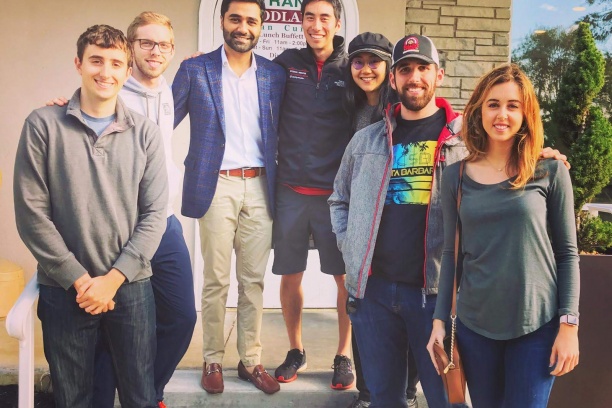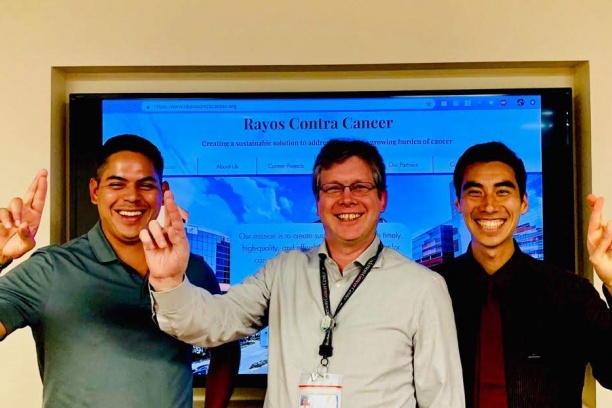With support from the Department of Radiology’s innovation incubator, RadX, Vanderbilt University School of Medicine (VUSM) alumni Benjamin Li, M.D., MBA, recently launched Rayos Contra Cancer, Inc. (RCC). A global health nonprofit 501(c3) organization, RCC’s mission is to “promote sustainable access to high-quality, timely and affordable radiotherapy for cancer in limited-resource settings globally.”
Spanish for “Rays against cancer,” RCC is rooted through meaningful partnerships in Latin America, through national cancer centers and thought-leading private establishments. RCC conducts bilateral education and training, pathways for innovative research, and accelerates clinical improvements for cancer care in limited-resource settings. It operates with an efficient model that organizes partnerships with academic and industry organizations, and provides a link between high- and low-middle-income countries.
The idea for RCC was first pitched at the department’s RadX Innovation Challenge in spring 2017. Since then, Li says the organization has grown, matured and gained fundamental traction.
“RadX helped me turn ‘it’ from an idea, into a project, into a proposal with a name, vision and mission,” said Li. “The early feedback sessions were critical in our conception, and have led to enormous returns. We have so much success to be grateful for thanks to good, supportive early mentorship, and those who believed in our idea.”
Brent Savoie, M.D., J.D., Assistant Professor of Radiology and founder of Guatemalan community health program Primeros Pasos, served as RCC’s primary project advisor during the Innovation Challenge. He now sits on the organization’s Board of Advisors. Reed Omary, M.D., M.S., Carol D. and Henry P. Pendergrass Professor and Chair, Department of Radiology, and former Vice Chair of Innovation Rick Abramson, M.D., also provided mentorship and insight to support the formation of RCC.
After RCC was pitched to various institutions and organizations, and the subsequent formation of partners located in the United States and Latin America, RCC officially launched at the end of 2018. With its multinational Board of Directors and diverse volunteer network, RCC now has activities spanning 19 countries in Latin America, Africa, the Middle East and Asia.
On the horizon, RCC is completing training for 10 developing cancer centers in HDR-Brachytherapy that will assist a clinic with little or no prior experience to be able to deliver efficient, high-quality treatments in as little as four months. RCC did similar pilot work for hypofractionation radiotherapy techniques (SBRT/SRS) that allow cancer treatment in significantly less time (reducing a seven-week treatment down to a few days, for instance), and will be scaling the SBRT/SRS program to five new cancer centers in Latin America. In parallel, RCC plans to build an Intensity-Modulated Radiation Therapy training program that will help centers that have acquired new technology transition from 2D treatments to 3D treatments, which will yield drastic improvements in patient treatment toxicities and outcomes. In total, RCC is reaching 40 clinics this year.
As for the long-term vision of RCC, Li has plans to incorporate other fields in health care, including radiology, pathology and neurology.
“I’d like to expand our offerings to include cloud-based collaboration, global health research, applications of new imaging techniques and technology, and improved coordination for holistic clinical development projects in conjunction with parallel organizations,” he said. “So far, everything is on track according to the vision.”
They have already expanded to include strategic, industry-leading partner organizations such as Project ECHO, ProKnow, Radiating Hope and Flexport who are dedicated to tele-health education, cloud-based RT-PACS and quality systems for radiation contouring and planning, United States-based radiotherapy equipment donation, and machine-learning integrated with freight forwarding. Through these partnerships, Li says that RCC will increase its efficiency, help clinics and economies thrive, and enrich the lives of those located in the countries they serve.
“Everything we do, we evaluate and we ask ourselves, ‘How can we do this better the next time?,’” added Li. “We communicate and learn from all our partner organizations as well, who have valuable years of lessons to share with us. The result is rapid, efficient growth and effective programs.”
Meanwhile, RCC is copiloting a grant in conjunction with the University of California, San Francisco, and MD Anderson Cancer Center to explore automated treatment planning at a developing partner clinic. They have also formed an artificial intelligence alliance with Medical Artificial Intelligence and Automation laboratories in Dallas, which could be broadly applicable to limited-resource clinics around the world. They have expanded to reach more clinics with diverse strengths for collaboration and have started a radiation oncology Latin American Cooperative Study group, while facilitating the acquisition of modern treatment machines and safe commissioning. RCC has a thriving volunteer network, and plans for expansion, which will support parallel initiatives under one umbrella.
RCC continues to have a strong base at Vanderbilt. VUSM students have established the first student RCC Chapter, “Rayos con Vanderbilt,” which has been involved in the strategic planning and implementation of RCC. Since its inception, RCC has also established projects with Vanderbilt business, nursing, public health, and education graduate students through Project Pyramid, a social entrepreneurship class offered through the Owen Graduate School of Management. In the coming year, the Vanderbilt RCC chapter will serve as the core to help other medical schools form their own chapters, while RCC plans to support new internship positions with the VUSM’s Master of Public Health program. These can be meaningful hands-on opportunities for students to collaborate with medical and industry leaders in the space of cancer development.
For additional information, and to find out how you can get involved, visit rayoscontracancer.org.

